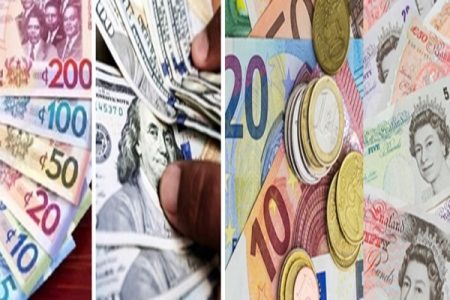The Ghanaian Cedi exhibited mixed performance last week, strengthening against the Pound Sterling while weakening against both the US Dollar and the Euro.
Specifically, the Cedi depreciated by 0.32% against the Dollar and by 0.09% against the Euro, but appreciated by 0.10% against the Pound Sterling.
By the end of the week, the Cedi’s mid-rate stood at GH₵14.8283 to the Dollar, GH₵19.0818 to the Pound Sterling, and GH₵16.1075 to the Euro.
Open market indicative rates showed the Cedi closing at GH₵15.2717 to the Dollar, GH₵19.6596 to the Pound Sterling, and GH₵16.5836 to the Euro.
Ghana Fixed Income Market
Investor interest in Treasury bills surged compared to the previous week’s auction.
The government raised GH₵4.06 billion, falling short of the GH₵4.78 billion target, reflecting a 15% undersubscription rate. Despite the shortfall, all bids for the 91-day, 182-day, and 364-day Treasury bills were fully accepted.
The yield on the 91-day T-bill remained unchanged at 24.79%. The 182-day T-bill yield increased by 3 basis points to 26.74%, and the 364-day T-bill yield rose by 5 basis points to 27.86%.
Ghana Fixed Income Market
Trading volumes on the GFIM decreased by 2.4% to GH₵2.93 billion last week.
Treasury bills dominated trading activity, comprising 67.95% of the total volume traded, while Sell/Buy back trades accounted for 26.71%.
Ghana Stock Exchange
The Ghanaian stock market continued its bullish trend, with the GSE Composite Index increasing by 3.94%, driven by strong performances from EGL and MTNGH, which offset declines in FML, GLD, and TOTAL.
The index closed the week at 4,490.18 points, yielding a year-to-date return of 43.45%.
However, trading activity significantly contracted, with a total of 967,278 shares traded, resulting in a turnover of GH₵11.78 million, representing a 93.64% decrease in trading volumes compared to the previous week.
Tesah Capital predicts that financial stocks and the ICT sector will drive the index’s performance in the upcoming week.
- Trump slaps tariffs: Ghana, UK-10%, EU-20%, others-50% - 2 April 2025
- BoG policy rate hike: MPC’s 3-2 vote and reasons - 2 April 2025
- Painter accused of stealing BoG cables granted GH₵1m bail - 2 April 2025

